As the 2017 Trade Period draws to a close, Sydney Swans historian/contributor Peter Blucher take a closer look at how the Sydney Swans have fared in silly seasons gone by.
All-in-all, a total of 51 players have been traded into the football club.
Blucher places 14 of those in the the "Swans Super-Trade Club" given their achievements on-field which include premierships, club championships, All-Australian honours and Coleman medals.
Part 1 of this three-part feature touches on the super trades and those unlucky not to make the grade.
Part 2 hones in on Tony Lockett, Josh Kennedy, Barry Hall, Ted Richards, Rhyce Shaw, Jason Ball and Paul Williams.
Part 3 will hone in on Darren Jolly, Shane Mumford, Nick Davis, Wayne Schwass, Martin Mattner and Mitch Morton.
...
The greatest impact.
In 2009 Paul Roos declared categorically that no footballer had made a greater impact on AFL football than Tony Lockett.
It was a clear and concise statement by a man as well-credentialled as any to make a definitive judgement on such matters, particularly when it involves the Sydney Swans and AFL football in the New South Wales capital.
Roos, a former Fitzroy champion, ventured to Sydney with Lockett to play in 1995 and later coached the Swans their first premiership in 72 years in 2005.
In a book titled “Sport is Life, Life is Sport’ which he produced in partnership with wife Tami, Roos suggested the move of Lockett from St.Kilda to Sydney was ‘meant to be’, and marvelled how the one-time Saints villain became such a Swans hero.
So it is not unreasonable, by extension, to suggest that the Swans’ trade capture of Lockett is among the best in club history. If not the very best.
Lockett had played 183 games for St.Kilda from 1983-94 after making his debut at 17 and had kicked 898 goals, including 117 in 1987, 121 in 1991 and 132 in 1992.
He’d shared the Brownlow Medal with Hawthorn’s John Platten in 1987, won the Coleman Medal and the St.Kilda best and fairest in 1987 and ’91 and was All-Australian in 1991-92. In 2003 he would be named in the St.Kilda Team of the Century.
He was an unquestioned superstar.
But the big, media-shy full forward from Ballarat wasn’t entirely comfortable in the intense spotlight of the football capital in Melbourne, and after much speculation throughout the 1994 season was snared by the Swans.
It was a trade that was finalised five minutes before the deadline, and officially sent Lockett to Sydney in exchange for Robert Neill, a young utility who had played 21 games in 1992-93-94, and selection #5 in the 1994 National Draft.
Neill played 23 games for the Saints over three years, including the 1997 losing grand final, while Joel Smith, chosen at #5 in the draft, played 58 games for St.Kilda and 163 games for Hawthorn.
And the Sydney outcome? A legend.
Lockett played 95 games from 1995-99 and a further three in 2002 in an ill-fated comeback.
He kicked 462 goals, including 110 in 1995, 121 in 1996 and 109 in 1998. Plus, he won the Bob Skilton Medal in 1995, was 4th in the Skilton Medal in 1996 and 6th in 1998, was All-Australian in 1995-96-98 and won the Coleman Medal in 1996-98.
In 2003 he was named in the Swans Team of the Century before he was inducted into the AFL Hall of Fame in 2006 and elevated to Legend status in 2015. In 2017 he was inducted to the Sport Australia Hall of Fame.
It would be a tough job determining whether the Lockett legacy is more about St.Kilda or Sydney. But he was All-Australian more often in 98 games for Sydney than he was in 183 games for St.Kilda, and he played six finals for Sydney, including a grand final, and only three finals for St.Kilda.
What is undeniable is that he kicked the most famous point in Swans history on 21 September 1996 when a long-range shot after the siren with scores level sunk Essendon in the preliminary final and hoisted Sydney into the 1996 grand final against North Melbourne.
And at the SCG on 6 June 1999 he kicked his 1300th AFL goal to break the game’s all-time record of 1299 held since 1937 by Collingwood’s Gordon Coventry, eventually setting a mark of 1,360 goals that is going to take a lot of beating.
Little wonder Roos was so effusive in his comments about the man known as ‘Plugger’.
Said Roos at the time: “No one could have predicted that the whole of Australia would be urging him on to the historic goal-kicking record he set. The front page of every paper in Australia hailed him as a hero and one of the most popular figures in Australian sport in 1999.
“There has not been a footballer who has made a greater impact on our sport than Tony Lockett.
“Why did the AFL get $780million for the 2009 television rights? There are of course many reasons but I’m suggesting had Tony Lockett not ventured to Sydney in 1995 the figure could have been a lot lower.”
Lockett was lost to the game for a long time in retirement, preferring his privacy, but returned to the Swans in a part-time coaching role in 2017.
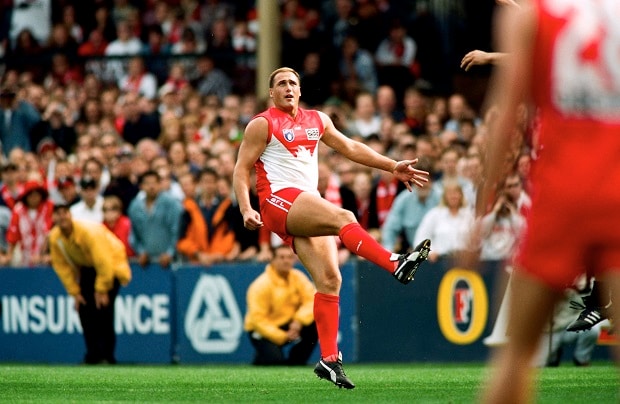
Tony Lockett kicks his record-breaking 1300th goal against Collingwood at the SCG.
Pure football impact.
Whichever way you look at it It’s hard to argue that the best trade in Sydney Swans history from a pure football impact is not the one that lured Josh Kennedy to the Harbour City.
In a hot field which underlines the quality of the Swans’ top-end trades, Kennedy’s durability and quality from a club and League perspective combined puts him among the very best trade-ins.
In the Bob Skilton Medal record in his first eight years at the SCG Kennedy has finished 3rd, equal 2nd, 1st, 3rd, 2nd, 1st, 1st and 4th. An extraordinary record.
Similarly, in six years in the Brownlow Medal since he stamped his mark on the competition he has polled 116 votes on year-by-year tallies of 19-14-21-28-14-23 to rank 1st, 3rd, 2nd, 1st, 4th and 1st in the club count.
In that time only 2016 winner Patrick Dangerfield has polled more votes with 116, while Kennedy is level with 2017 winner Dustin Martin (116), ahead of 2015 winner Nat Fyfe (107) and Joel Selwood (106).
Completing the top 10 vote-getters from 2012-17 are while 2009-13 winner Gary Ablett (99), Scott Pendlebury (99), 2012 winner Trent Cotchin (97), 2014 winner Matt Priddis (96) and Swans teammate Dan Hannebery (95).
And of the Swans’ 197 games from 2010-2017 Kennedy has played 191. This sees him rank equal first with Heath Grundy, and ahead of Hannebery (186), Kieren Jack (182) and Nick Smith (178), and all others at the club during this period.
Plus, he has All-Australian three times, was desperately unlucky to miss out in 2017, and, after a fine apprenticeship under the leadership of Adam Goodes, Brett Kirk, Craig Bolton, Jarrad McVeigh and Jack from 2010-16, he did an excellent job when elevated to the captaincy in 2017.
He’s averaged 27.03 disposals over his time in red and white, and kicked 131 goals.
It wasn’t that Hawthorn didn’t want Kennedy, who was a third generation member of a family that is like football royalty at Hawthorn. He was the son of 241-game four-time premiership player John Kennedy Jnr and grandson of three-time premiership coach and AFL Hall of Famer John Kennedy Snr.
He had originally joined the Hawks as a father/son selection in the 2006 National Draft, and had played 13 games in 2008-09, averaging 18.08 disposals and kicking four goals.
At the end of the 2009 season Kennedy called a meeting with Hawthorn coach Alastair Clarkson to see where things stood. He had been offered a one-year extension by the Hawks while the Swans had tabled a three-year offer.
Clarkson was honest with the 21-year-old ‘prince’. With the likes of Luke Hodge, Sam Mitchell, Jordan Lewis and Brad Sewell at his disposal, he couldn’t guarantee Kennedy a place in the immediate future.
So, much to the chagrin of many at the club, Clarkson, believing he was doing the right thing in giving Kennedy a chance to play regular senior football, agreed to let him go to Sydney.
John Kennedy Snr said at the time he was not upset - just disappointed. “I don’t agree with it, but I respect their call … it is a ruthless and tough industry,” Kennedy Snr told the Herald Sun.
So, Kennedy was bundled up with fellow Hawk Ben McGlynn and traded to the Swans in exchange for selections 39, 46 and 70 in the 2009 National Draft.
Officially, Kennedy was swapped for pick 39, and McGlynn went for 46 and 70 as Hawthorn also traded to bring in Shaun Burgoyne and Josh Gibson is the same period.
And while selection 39 reaped only three games for the Hawks via Sam Grimley, who was later re-drafted by Essendon, they did pick up two premiership players with the two latter picks. Ben Stratton, a 2013-14-15 premiership team member, went at #46, and Matt Suckling, a premiership player in 2014-15, went at #70 as a rookie elevation.
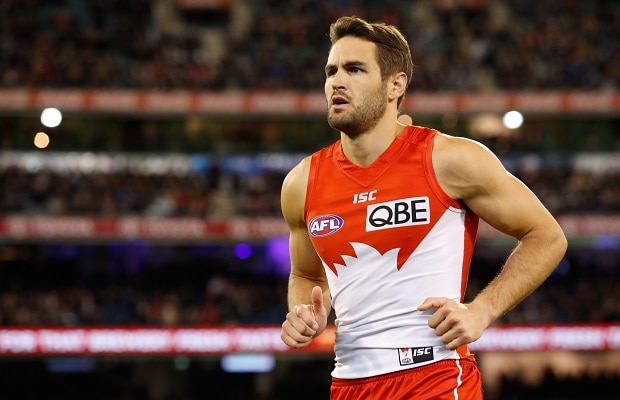
Three-time Club Champ and skipper Josh Kennedy.
After seventy-two years..!
A total of 852 players had worn the red and white jumper of the Swans for the first time between the club’s fourth premiership in 1933 and the fifth in 2005. It was seventy-two long years. And who was the player to hold aloft the premiership cup with coach Paul Roos in 2005. Barry Hall. A trade-in.
Hall was transferred from St.Kilda to Sydney in October 2001. And while it was a deal that would ultimately be regarded as one of the biggest and most significant trades in AFL history, little did anyone know at the time how Hall would feature so prominently in an epic moment in Swans history.
Soon after 2pm on 24 September 2005 Hall led the Swans onto the MCG through a banner which sent a simple message to long-suffering South Melbourne/Sydney fans.
It read: “You’ve kept the faith so this one’s for you – Onwards to VICTORY’.
About 5.30pm, amid the euphoria of the droughting-ending four-point win over the West Coast Eagles, Hall strode to the dais to stand alongside coach Roos as one of the Swans great favorite sons, Paul Kelly, prepared to present the premiership cup.
Roos and Hall help the cup aloft before being swamped by triumphant Swans players.
If you ask Hall exactly what was going through his mind at the time you get any number of different answers, but among them should have been a reflection on the trade that made it all possible.
Hall, a former junior boxing champion from the small town of Broadford in central Victoria, had played 88 games and kicked 144 goals for St.Kilda from 1996-2001. He played in the 1997 grand final in just his 19th game, topped the club goal-kicking in 1999 and 2001, and finished 6th-9th-6th in the club best and fairest award in 1999-2000-2001.
He was an aggressive youngster who quickly became one of the competition’s more imposing figures, and in the last home and away game of 2001 he kicked a goal after the siren for the Saints to beat Hawthorn.
But things weren’t quite right at Moorabbin. St.Kilda had recruited Fraser Gehrig from West Coast and had drafted Nick Riewoldt and Justin Koszchitzke. Their salary cap was tight and something had to give. It was Hall.
As former St.Kilda full forward Tony Lockett had done six years earlier to thrive on the relative anonymity of Sydney Hall was traded to the Swans.
It was a complicated four-way trade which ultimately saw St.Kilda pick up Nick Dal Santo with selection #13 and Geelong snare James Kelly with selection #17.
But regardless of what 300-gamers Dal Santo and Kelly did elsewhere, it was a massive Swans win.
In addition to his unforgettable grand final moment in 2005 Hall went on to play 162 games in the Swans #1 jumper and kick 467 goals, ranking 3rd in games for the club by trade-in players behind Ted Richards and Josh Kennedy, and 1st in goals, narrowly ahead of Lockett.
That Hall and Lockett, with 929 Swans goals between them despite starting their careers at St.Kilda, rank 3rd and 5th on the all-time Swans goal-kicking list makes the club’s decision to trade for them a double win of the highest order.
Hall topped the Swans goal-kicking seven years in a row from 2002-08 to equal the club record of Len Mortimer from 1906-1912, and was runner-up in the 2005 Coleman Medal.
In his first five years from 2002-06 he finished 6th-4th-1st-2nd-4th in the Bob Skilton Medal, and won All-Australian selection in 2004-05-06. He won the AFL Coach’s Association Player of the Year in 2005, and was All-Australian vice-captain in 2006.
But the honour of accepting the premiership cup in 2005 was something that came out of the blue.
Stuart Maxfield, drafted by the club in 1996 after six years and 89 games at Richmond, was appointed captain by coach Roos in 2003 after the Paul Kelly retirement and led the club in 2003-04.
But early in 2005 Maxfield stepped down for personal reasons and Hall was given the job before sharing the captaincy with Leo Barry and Brett Kirk in 2006-07.
After retiring at the end of 2009 he made a surprise comeback with the Western Bulldogs, playing 39 games in 2010-11 and kicking 135 goals. He was the Dogs’ leading goal-kicker in both years to become the first player in AFL history to kick 100 goals with three clubs, and won a third All-Australian selection in 2010.
When he finally hung the boots up he ranked 14th in all-time AFL goals before another boom Sydney recruit, Lance Franklin, pushed him down the list to 15th.
He was inducted into the Swans Hall of Fame in 2014 and the AFL Hall of Fame in 2017.
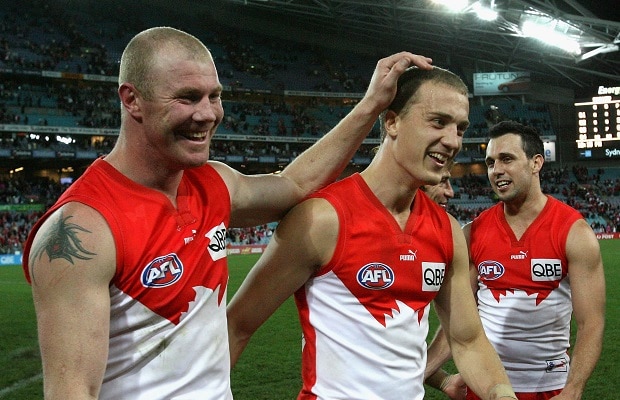
Barry Hall and Ted Richards celebrate a win.
An extra good return.
If you trade in a player who at 22 has already played 33 games in five years with a rival club, and no more than 11 games in any one season, what might you expect to get in return?
Maybe six years and 100 games? Certainly, that wouldn’t be a bad return.
But Ted Richards, traded from Essendon to the Swans under precisely those circumstances in 2005, delivered much more than what might have been expected to certainly earn a spot in the Swans SuperTrade Club.
In a pure games sense Richards is top of the list among players traded in to the Swans. The ever-reliable fullback played 228 games from 2006-16 to sit 19th on the club’s all-time list.
He finished second in the club championship in the 2012 premiership side, when he was also All-Australian, and was fifth in the 2011 club championship and seventh in 2013.
And that is only the statistical component of the Richards trade. One of the most highly regarded defenders in the game in his prime, he was also an invaluable leader during his 11 years at the SCG, and helped build the culture for which the club has been so highly regarded.
Originally drafted by Essendon at selection #27 in the 2000 National Draft, Richards had five years with the Bombers without ever really consolidating a senior berth.
After failing to break into the senior team in 2001 he played 2-10-11-10 games in 2002-03-04-05 and never more than six games in a row.
In a masterstroke from the Swans recruiting team, he was targeted specifically by the club and lured north essentially in exchange for selection #19 in the 2005 Draft.
Essendon used this pick to claim Queenslander Courtney Dempsey, who played 133 games over precisely the same period as Richards so proudly wore the Swans #25 jumper.
Richards sits at the top of a list of eight trade-ins who have played more than 100 games for the Swans – Richards (228), Josh Kennedy (191), Barry Hall (162), Rhyce Shaw (143), Ben McGlynn (143), Martin Mattner (124), Darren Jolly (118) and Paul Williams (117). Plus, Tony Lockett and Wayne Schwass played 98.
He also ranks fifth overall in finals played for the Swans with 21, behind only Adam Goodes (28), Jarrad McVeigh (27), Jude Bolton (26) and Ryan O’Keefe (24).
The trade that keeps on giving.
There wasn’t a lot of fuss in 2008 when the Sydney Swans traded selection #46 in the National Draft to collect for Rhyce Shaw. But nine years on it is a trade that continues to reap enormous rewards. For Shaw and the Swans.
The dashing half back flanker played 143 games for the Swans, including the 2012 premiership, and twice finished runner-up in the club championship in 2009 and 2011. Among players traded to Sydney only Ted Richards (228), Josh Kennedy (191) and Barry Hall (162) have played more games for the club.
But it didn’t end there. Since hanging up- the boots the former Collingwood star has moved into the coaching ranks to play a key role in the ongoing development of the Swans’ young talent.
And, after winning the ‘Best Assistant Coach’ award from the 2017 AFL Coach’s Association, he stepped up to take charge of the Swans defensive unit in what shapes as a long and fruitful coaching journey.
It is an overall Swans contribution that certainly makes the Shaw trade one of the best. And all in exchange for a selection which Collingwood used to secure Luke Rounds, who played six games in 2011-12 before being de-listed.
But as much as history shows it was a move hugely beneficial to the Swans, Shaw is adamant it did just as much for him.
"Coming up here changed my life," Shaw told Channel Seven after being carried from the ground after the Swans’ semi-final loss to North Melbourne at Stadium Australia in 2015 in his 237th and last AFL match.
"It's been a fantastic journey and I'm really sad it's come to an end (but) the body's packed it in and it's a good time (to go out)."
"This club (Sydney) has been a massive part of my life both on and off the field. Coming up here (to Sydney) and being part of a footy cub that wrapped their arms around me and brought me into their team and the culture … It's made me a better person.”
Shaw admitted at the time he was destined for the football scrapheap or life as a "bricky's labourer" had he not left Collingwood at the end of 2008 to join the Swans.
He had enjoyed a mixed ride with the Magpies, where the name Shaw was like royalty. His father Ray was club captain, his uncle Tony was a club premiership captain and coach, and brother Heath was a teammate.
Despite playing 94 games in the black and white stripes, including the 2003 grand final loss to Brisbane, and wearing the No.22 jumper of club legend Bob Rose, he never really made it. Not totally.
He admitted he had been “very inconsistent” on the field at Collingwood, and that his life “wasn't great” off the field. He needed a fresh start away from the intense focus that was always going to be on him at the club.
He got exactly that via the unheralded trade, and when the Swans won the flag in 2012 he joined brother Heath, a premiership player with Collingwood in 2010 and later to play with the GWS Giants, in the AFL’s exclusive premiership club.
In 2009 he finished second behind Ryan O’Keefe in the Bob Skilton Medal, and in 2011 he was second, equal with Josh Kennedy, behind Adam Goodes.
In seven years as a Swans player he had six 20-game seasons, missing out only due to injury in 2013, and, described by coach John Longmire as “a terrific football person”, became a well-respected part of the off-field leadership team.
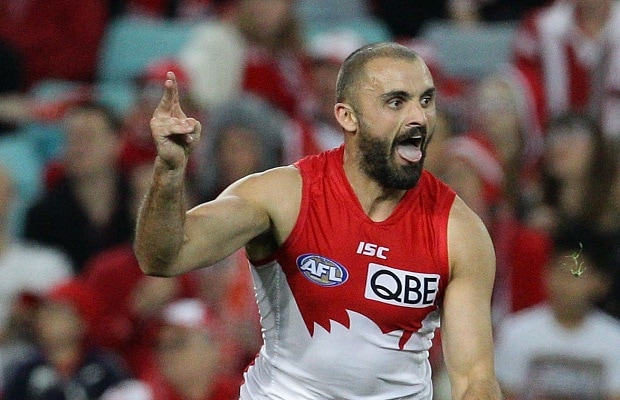
The Sydney Swans received more than just a dashing defender in Rhyce Shaw but a loyal clubman.
Even in the board room.
Among all the players traded into the Sydney Swans only one has gone on to be a club director. And an AFL Commissioner. Jason Ball.
A finance and stockbroking specialist, Ball proved not just a significant win for the club’s on-field team but a giant plus, too, for the off-field team.
Originally from Perth and a WA zone selection in the 1991 National Draft, he was a 103-game player with the West Coast Eagles from 1992-99 and a member of the club’s 1994 premiership side.
He was traded from one side of the country to the other in exchange for selection 11 and selection 41 in the 1999 Draft.
And although West Coast picked up future captain and four-time All-Australian defender Darren Glass with selection #11 there is no doubt the Swans would do the same deal again in a heartbeat.
Ball was a colossal pick-up in a trade which gave birth to one of the great AFL fairytales.
On 24 September 2005, in his 193rd and last AFL game, and his 90th game for the Swans, Ball was a member of the side which beat West Coast by four points to win the club’s first flag since 1933.
It was the day Swans defender Leo Barry took a spectacular mark in the closing seconds to secure victory for his side and make Ball the seventh player in Swans history to win a flag in his last game. Those prior to him were:-
1909 - Horrie Drane – He played 35 games for Melbourne from 1902-06 before switching to South Melbourne in 1907. Despite playing only 18 games in three years with the Swans, and only one game in the 1909 home-and-away season, he was called into the 1909 grand final side when wingman Jim Caldwell was suspended in the preliminary final. They won by two points and at 28 he retired.
1918 – Jim Graham – A back pocket player, he played only one season and 15 games for South Melbourne, enjoying 14 wins and a five-point loss to St.Kilda in Round 4. His only loss was part of club folklore, with the South players said to have been below their best after spending two days as guests of a club patron at his holiday home in the Dandenongs in the lead-up to the match. South beat Collingwood by five points in the grand final with a late soccer goal from Chris Laird. Graham retired from the then VFL aged 26, and later played with Port Melbourne in the VFA.
1918 – Jack Howell – A tireless ruckman, he played 40 games for South from 1915-18, missing the 1916 season when the club chose not to play due to the war. He left the club at 23 after the 1918 grand final, and later played with Footscray and Prahran in the VFA. He was the senior member of the only family in VFL/AFL history in which three members have played in grand finals – his son Jack ‘Chooka’ Howell played for Carlton in the 1947 grand final against Essendon, and his grandson Scott Howell played for Carlton against Collingwood in the 1981 grand final.
1918 – Alan Donoghue – A centre half back, he played nine games with Richmond in 1912 and switched to South Melbourne in 1914. He played 44 games for the Swans, including the 1914 grand final loss to Carlton and the 1918 grand final win over Collingwood. He retired at 27.
1918 – Gerard Ryan – A full forward, he played 26 games for South Melbourne in 1917-18, and topped the club goal-kicking in the 1918 premiership campaign. He kicked three goals in the grand final win before retiring at 22.
1933 – John Bowe – A wingman from Western Australian club Subiaco, he played only one season and 17 games with South Melbourne in 1933 before returning home after their 42-point grand final win over Richmond. He was later the WA State captain.
The only other player listed in the Swans record books as having played in a premiership win in his last game for the club is Alex Johnson. He savoured the club’s 10-point grand final win over Hawthorn in 2012 in his 45th game before a string of knee problems saw him miss the next four seasons. He returned in 2017 without breaking back into the senior side but is still hoping to continue his career.
Ball, well-remembered for his expert tap work which helped create three goals for Nick Davis in the Swans’ stunning come from behind semi-final win over Geelong, also etched his name into the AFL record books as just the 21st player in AFL history to play in a premiership with two clubs.
At 32 he was the oldest player in the 2005 grand final when he shared the Swans’ ruck duties with Darren Jolly against West Coast’s Dean Cox, who has joined the Swans coaching staff for 2018, and Mark Seaby, who later played for the Swans in 2010-11-12.
But his valuable on-field contribution was not the only benefit the Swans got from the Ball trade. He joined the coaching staff in 2006, helping to mentor young players, and joined the Board in 2007 after being nominated by club legend Bob Skilton and 2005 Swans premiership coach Paul Roos.
He said at the time he believed that as a recently-retired member of a Swans leadership group which had embraced the player's cultural reinforcement he believed he could make a significant contribution to the board and club generally. And he was right.
He was appointed to the AFL Commission in March 2015 when he and Major General Simone Wilkie, at the time Australia’s most senior female army officer, replaced ex-Hawthorn champion Chris Langford and Union heavyweight Bill Kelty.
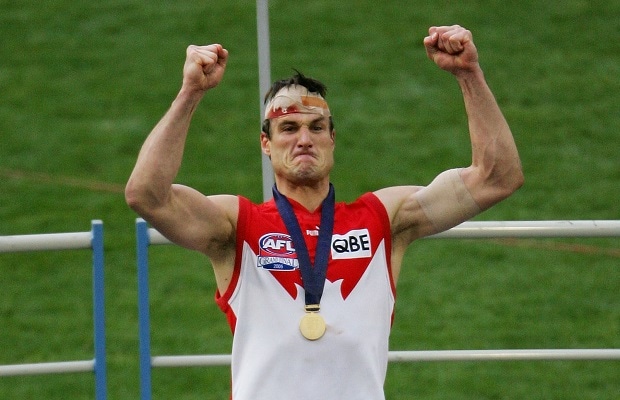
Jason Ball won a premiership in his final game of AFL football.
A double payback.
It is a special effort for any player to win the club championship in his first season at an AFL club. But for a player to do it in his first season and his second season is exceptional.
Swans trade-in Paul Williams did precisely that in 2001-02 in a feat unrivalled since the inception of the club championship, now known as the Bob Skilton Medal, in 1926.
Toss in All-Australian selection in 2003, a 2005 premiership medal and a spot in the 2006 losing grand final team and it’s a package that makes the Swans’ trade investment of selections #8 and #39 in the 2000 National Draft more than justified and puts the midfielder/utility into the Swans SuperTrade Club.
Originally from North Hobart and drafted by Collingwood at #70 in the 1989 National Draft, Williams was 27 and had played 189 games with the Magpies from 1991-2000 when he sought a move to the Harbour City.
Having joined Collingwood in the year immediately after the club’s breakthrough premiership in 1990, he had played only one final in his decade in black and white – a two-point qualifying final loss to West Coast at the WACA in ’94.
It was all part of a hugely complicated exchange period which eventually saw North Melbourne use selection #8 to draft Daniel Motlop, who played 47 games for the Kangaroos and 83 games for Port Adelaide, and Fremantle use selection #39 to acquire Adam McPhee, who played 81 games for the Dockers before 142 games for Essendon.
In the same period, Collingwood picked up James Clement and Brodie Holland from Fremantle and Jarrod Molloy from Brisbane, Brisbane picked up Mal Michael and Richard Hadley via selection #22, and Geelong got Josh Hunt via selection #44.
If you can’t grasp all of that you’re not alone. And if you ask anyone at the Swans they won’t care. They got their man.
Williams, named in the Tasmanian Team of the Century in 2004, went on to play 117 games for the club from 2001-06, becoming the 45th player in the game’s history to reach 300 games.
He narrowly beat Stuart Maxfield and Ben Mathews to win the Swans club championship in 2001, was a comfortable winner ahead of Daryn Cresswell in 2002, and finished eighth in his All-Australian year of 2003.
He is one of only eight players in Swans history to have won two or more consecutive club championships, alongside Herbie Matthews (1936-37 and 1939-40), Billy Williams (1946-47), Ron Clegg (1948-49), Bob Skilton (1958-59, 1961-65 and 1967-78), Peter Bedford (1969-71), Gerard Healy (1986-88) and Paul Kelly (1992-93 and 1996-97).
Also, Williams was one of only six players have won the club championship in his first season in red and white, following Bill Faul (1932), Frank Johnson (1960), John Murphy (1978), Tony Lockett (1995) and Andrew Schauble (2000).
Like Williams, Schauble was picked up from Collingwood, while Lockett joined the Swans from St.Kilda, and Murphy reached the club via Fitzroy. Faul and Johnson won the Swans club championship not just in their first season at the club but in their first season in the competition.
After leaving Sydney Williams was an assistant-coach at Melbourne from 2007-08, the Western Bulldogs 2009-11 and Carlton in 2012. During his time at the Dogs he was caretaker senior coach for three games late in 2011 after Rodney Eade’s departure.
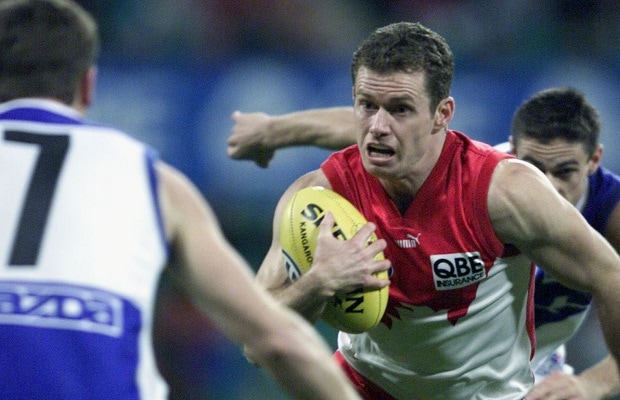
Paul Williams burst onto the scene at the Sydney Swans, winning a Club Championship in his first two seasons at the football club.


